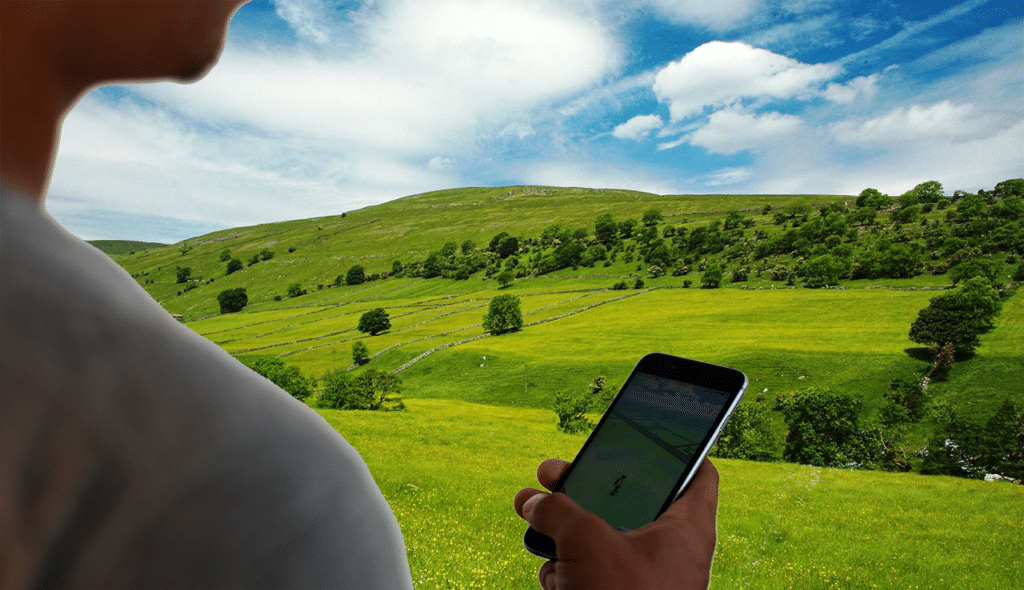We would probably have to write several thousand blog posts to fully detail all the remarkable stories that have emerged since Pokémon GO was unleashed upon the world. We won’t do that, but we will give you a telling item that pretty well sums up what’s transpired:
“We encourage all people playing Pokémon Go to be aware of their surroundings and to play with friends when going to new or unfamiliar places.”
That’s the safety warning Nintendo was compelled to issue in the wake of Pokémon GO’s release. The game has been THAT all-consuming!
Pokémon GO Stories
Perhaps the most delightful example of this app-induced delirium is one that comes to us from Florida. There was meteorologist Bobby Deskins of station WTSP, standing in front of the map and giving the weather report as usual. Suddenly, along comes anchor Allison Kropff, strolling right in front of the live camera, phone in hand, head down, oblivious. What was she doing? You guessed it. Pokémon GO.
Many of the stories, like the one above, are quite funny. Others border on the … well, I suppose you could say “personal?”—one man managed to capture a “Pidgey” (an avian Pokémon!) while his wife was in labor! Still others prove there are legitimate reasons why the company issued that warning—one player noted in a reddit post they’d broken their foot while playing!
So why exactly is the game so addictive? I mean, virtually overnight, it’s outpacing Twitter for active users in the US. Twitter!
Augmented Reality
Many have posited that it has to do with its “augmented” or “mixed” reality nature. The experience of the game thoroughly interweaves the “real” world with the “imaginary” (or virtual, or technical) world. What’s remarkable about this is that the game itself relies on straightforward technology; it essentially uses your phone’s GPS to source information about your “real” environment, so that it can then place “imaginary” game components into it. This aspect in and of itself is an important conceptual leap forward, as developers continue to explore what the future holds for realities virtual, augmented, or otherwise.
Engagement, Retention, Virality and Monetization
The always-insightful team at TechCrunch have published an excellent article that looks at critical factors contributing to the unprecedented success of Pokémon GO. They highlight engagement, retention, virality and monetization, and detail how in each case, the designers have deployed winning strategies. The game is rife with subtle incentivizations that keep the user motivated, intrigued, and actively engaged with the game. Crucially though, none of these mechanisms are blockers—for example, you don’t have to pay to play. You likely will, but you don’t have to. This is another lesson for developers to absorb: great design and genuinely rewarding incentives win in the end over tricks and traps.
Pokémon GO is good for you?
Many observers have noted the actual physicality of the game experience. Meaning, people have to move to play. I was speaking to a colleague about this, who noted a certain sibling and spouse as being likely the laziest people in the world. Yet what were they doing together yesterday? Walking. For miles! Miles and miles of Pokémon GO. Now, at face value, this may not seem like a universally applicable lesson for app developers to absorb. After all, not every app is meant to send you on a long hike trying to find imaginary creatures in your local park. But, upon deeper inspection, there is something very important to note here. When people feel good physically, they are more excited, more upbeat, more positive. They are energized. People in this state are receptive to experience, and they are eager to repeat pleasurable experiences. Repeat experiences are exactly what app developers are trying to inspire.
Augmented Reality, Social Reality
There is something else very significant happening here as well. Augmented reality is impacting social reality. In an age where everyone from teachers to preachers to parents to politicians regularly bemoans how anti-social social media is making everyone, suddenly along comes Pokémon GO, actually bringing people together “in real life.” In Grand Rapids, thousands will gather on Friday for a massive Pokémon GO hunt. In Connecticut, public landmarks are turning into community gathering sites virtually overnight. This article in the Daily Mail collects some amazing stories of burgeoning romances brought about by playing the game. Here in the Bay Area, Oakland Athletics star outfielder Coco Crisp admits that the game has taken over the clubhouse and sent players out into the streets where they are crossing paths with, among other things, people out on Pokémon pub crawls! Perhaps most famously, New York’s Central Park has turned into what people are calling “Pokémon HQ.” If you’re a developer, this is overwhelming stuff. In a post-Pokémon GO world, you’re suddenly building to meet entirely different expectations of what constitutes true interactivity and engagement.
Who Gets The Credit For Pokémon GO?
In some respects, you might say that Nintendo foreshadowed its own revolution—after all, it was Nintendo that brought us the Wii, which certainly helped usher in this new era of social gaming taking place in three-dimensional space. And speaking of Nintendo, we haven’t even touched on brand or product recognition yet in discussing the success of Pokémon GO, but this is obviously a factor as well, though neither Nintendo nor the Pokémon franchise could be said to have been in its heyday just prior to the launch of Pokémon GO. Still, they are highly recognizable names, and this success adds a new layer of complexity to the already complicated relationship existing between large studios and indie developers. Given that the app was actually developed by a start-up called Niantic, which is actually a post-Alphabet spin-off from Google, the story gets all the more complicated. For aspiring app developers aiming for roles in this brave new world, it is rapidly becoming a necessity that one seek expert guidance when trying to plot a career path.
Going Mobile
Ultimately though, the real lesson here may simply come down to the device itself, which so many of us still antiquatedly refer to as “the phone.” Rethinking, reconceptualizing, and re-philosophizing what exactly this device is—and is capable of—is rapidly becoming the app developer’s greatest challenge.
App developers have their eyes turned to a future that most certainly includes as-of-yet unknown and potentially life-altering developments in virtual reality, artificial intelligence, and more. And unquestionably, a great deal of this future is going to play out on and in these devices. What we’re learning from the phenomenon of Pokémon GO, is that these devices no longer end at the boundaries of either their casings, or their connections. They extend into the “real” world. The developers who best internalize and comprehend this new truth are likely the ones who will be shaping our next wave of technological advancement.
Call it a “location-based augmented reality mobile game” if you’d like, but to do so diminishes Pokémon GO’s Rosetta Stone-like powers to decode a future we’re rapidly approaching, one in which the lines between realities continue to blur and fade.
The Next Pokémon GO?
Somewhere in the world very soon, someone is going to start building the mobile app that becomes the next Pokémon GO. Will it be you? There is only one way to know—you have to start building. Our Nanodegree programs are designed to get you doing just that, and if it’s mobile apps you’re into, we’ve got your programs. Enroll in either our iOS or Android App Developer Nanodegree programs, and you’ll immediately begin building apps and mastering critical technical skills. No programming experience yet? No problem. We’ve got beginner versions of both programs. No matter the skill level you start at, we’ll make sure you learn what you need to succeed. Now, about your idea … what was it you were going to build?
Ready to build the next Pokémon GO?
Enroll today, and start right away!




